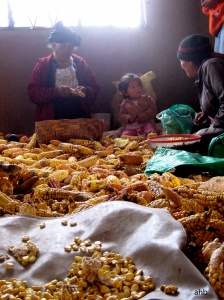Dona Margarita, an indigenous woman from La Calera, Ecuador, graciously gave me permission to use this beautiful photo. University of Wisconsin students visit Magdalena’s village each year to learn about indigenous culture and work with the community. I join this field course, led by anthropologist Frank Hutchins, as a public health instructor, exploring determinants of health and well-being alongside the students, and addressing topics that range from access to water, to gardens and family nutrition, to basic first aid, to micro-enterprise for women.
This visit took place around the time of the harvest of quinoa and maiz. Margarita and her granddaughter are shelling maiz. As she explained the local agricultural cycle to our students, one of them knelt down to help, and before we knew it we were all on our knees, working and listening. During such moments students learn about health problems that communities face, the resilience of women like Margarita, and the efforts that the community has made to move forward.
One year students helped Margarita plant her potato field. The next year she was behind a closed door in a dark house, grieving. One of her sons, who she had worked so hard to nurture and educate, was killed while working in Quito with at risk youth. While the details of his violent death were murky, it was clear that, in addition to facing the challenges of rural poverty, Margarita and her family live with a double burden, as they are also touched by problems associated with rapid urbanization a struggling national economy, insecurity and political unrest.
The young man in the photo is Margarita’s other son, Luis, who serves as a guide in our community work, in addition to working the land himself, he is committed to preserving his culture, and earns a living as a guide and leader in the local eco-tourism movement. Luis and his neighbors hope that they can find ways to share their culture, and at the same time create economic alternatives to destructive mining, the rise of the flower export industry, and other practices which may not be sustainable, healthy or equitable, and do not embody indigenous values.
Maragarita’s life is intimately intertwined with the life-cycle of the maize and quinoa that she grows. Quinoa, a high-protein grain touted as a miracle food, is the staple of the indigenous food tradition in this region of Ecuador. The year this photo was taken, the quinoa crop had failed. The climate is changing, members of the community observed, and they felt sure it had something to do with how we, all of us, are living. There is a growing body of research suggesting that people like Margarita are the first to notice the effects of climate change, and perhaps can help to identify early warning signs. During their time in Ecuador, the students are encouraged to compare their environmental footprint with Margarita and the other residents of La Calera. We all return to Wisconsin with the awareness that, in addition to working side by side with Magdalena’s community to address poverty, we in Wisconsin need to change some things about how we are living. Together we discover and rediscover the importance of learning from, standing with, and when necessary standing for, people like Margarita. People who we are privileged to share the world with. People who are a lot like us.
Based on Remarks from UW-Madison Global Health Retreat, May 2010
Photo: Abriana Hau Barca, 2008



